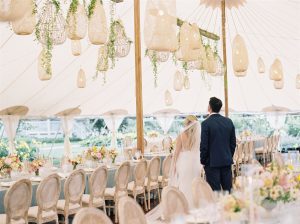To understand how to become a wedding planner, start by gaining experience through internships or assisting with event planning to build practical skills. Create a portfolio to showcase your work, and consider obtaining certifications from recognised industry bodies to boost your credibility. Networking with vendors and staying current with wedding trends will also be essential for your success in this creative and dynamic field. This guide will show you how to become a wedding planner, the qualifications needed, and the essential skills for success.
What are the different kinds of wedding planners?
The wedding planning industry is vast, with many types of planners, each catering to a different element of the wedding, hence their specialisation. Here are the main types of wedding planners:
- Full-Service Wedding Planner: A comprehensive wedding planning service that takes care of every aspect of the wedding, from the initial stages to the big day. This includes creating the budget, selecting vendors, coordinating the wedding day, and more.
- Partial Wedding Planner: This type of planner does not manage the wedding from start to finish; instead, they focus on specific elements, such as vendor selection and budgeting. Couples remain involved in the planning process but hire help for certain areas.
- Wedding Coordinator: A wedding coordinator focuses solely on executing the wedding day itself, organising all the moving parts, liaising with vendors, and resolving any issues. They do not handle the planning phase.
- Destination Wedding Planner: Specialises in weddings that take place in another location, managing all travel details, including accommodation arrangements and ensuring the couple’s vision is realised at the destination.
- Event Designer or Stylist: These professionals focus on the visual elements of the wedding, including the theme, decor, and overall atmosphere. They collaborate with the couple to bring their design ideas to life, but they do not manage logistics.
- Elopement Planner: Specialises in small, intimate weddings (elopements), often for couples who want a simple, private ceremony with minimal guests. Elopement planners handle all the details, even for quick, low-key weddings.
- Corporate Wedding Planner: Works with organisations or high-profile individuals to plan large, extravagant weddings. Corporate planners often handle complex logistics and coordinate high-budget weddings, which may include press conferences, social gatherings, and corporate events.
Each type of wedding planner has its own area of expertise, which is why industry professionals often choose to specialise in a niche to stand out in the market.
What is The Role Of A Wedding Planner?
A wedding planner is responsible for overseeing all the work at a wedding and ensuring every detail aligns with the couple’s expectations. Here’s an overview of the main responsibilities of a wedding planner:

- First Meeting with Clients: This is the initial meeting between the wedding planner and the couple. It is an important opportunity for the couple to explain their vision for the wedding, share their ideas, budget, and expectations. From this point, everything starts to take shape, paving the way for future interactions.
- Management of Budget: Wedding planners assist couples in preparing and managing a realistic budget, which helps guide the planning of every aspect of the wedding.
- Vendor Selection and Management: Wedding planners compile a list of potential providers, such as florists, caterers, photographers, entertainers, and others. After reviewing the options, they select vendors and negotiate the terms of their contracts, ensuring the right providers are involved in the ceremony.
- Venue Selection: The planner helps the couple find a suitable location that fits their theme and budget. This includes making arrangements for seating, décor, and any necessary items, and ensuring everything is aligned with the couple’s vision.
- Event Design and Styling: Wedding planners typically assist with the design and styling of the wedding, helping to select the theme, colour schemes, decorations, and day-of floristry. They may also work alongside an event designer or stylist to bring the couple’s vision to life in a cohesive manner.
- Timeline Creation: One of the final steps in the planning process is creating the timeline for the big day. This includes scheduling when the ceremony will begin, the reception, speeches, and other key events. The planner drafts this timeline to ensure everything runs smoothly on the day.
- Day-Of Coordination: On the wedding day, planners manage the setup, coordinate the vendors, and assist the couple throughout the event. Their role is to ensure everything runs according to plan, allowing the couple to enjoy the ceremony without stress.
- Handling Emergencies: Weddings can be unpredictable, so planners are prepared to handle last-minute changes, cancellations, or unexpected issues, such as bad weather or logistical challenges.
Essentially, wedding planners ensure everything goes according to plan, allowing the couple to enjoy the day without worrying about the details, and helping them bask in the joy of their celebration.
Average Wedding Planner Salary
Salaries for wedding planners can vary based on experience, location, and the type of clientele. Below is a breakdown of average earnings for wedding planners across the UK:
- Newly Joining Wedding Planners: Wedding planners who are new to the industry typically earn between £18,000 and £25,000 annually. Junior planners may work as assistants or sub-coordinators alongside more established senior planners.
- Mid-level Wedding Planners: A planner with a few years of experience can expect to earn between £25,000 and £40,000. Mid-level planners often oversee larger weddings and are more independent in their roles, thanks to their increased experience.
- Experienced or High-end Wedding Planners: Experienced wedding planners with a strong portfolio and established reputation can earn between £40,000 and £70,000. The most expensive planners, who cater to high-budget weddings, are those known for handling luxury weddings and who have built significant trust within the industry.
- Self-employed and Freelance Wedding Planners: Freelance and self-employed wedding planners typically charge according to their experience and reputation. They may charge a percentage of the wedding budget (usually around 1%) or a fixed rate, which typically ranges from £1,000 to £10,000, depending on the complexity of the event.
Essential Skills Required for a Wedding Planner
A well-qualified and competent wedding planner is essential for planning and assisting with weddings. Grey also outlines key skills that increase the likelihood of success for both the wedding planner and the client. These skills required for a wedding planner include:

- Coordination Skills: A wedding planner must handle numerous vendors, schedules, and tasks. Coordination is crucial in planning each aspect of the wedding and ensuring everything runs smoothly.
- Communication Skills: Building strong relationships with clients and vendors is vital. Wedding planners must communicate their intentions clearly, negotiate contracts, and fulfil requests effectively.
- Financial Skills: Wedding planners are responsible for creating and managing the budget. They need to help clients allocate funds wisely and ensure the budget is adhered to throughout the planning process.
- Problem-Solving Ability: Weddings do not always go according to plan. Whether it’s a last-minute issue, an unexpected concern, or bad weather, a wedding planner must remain calm and find a solution quickly.
- Creativity and Vision: Wedding planners must have a strong sense of design, style, and trends. Their creativity enables them to transform the couple’s ideas into a beautiful, cohesive wedding experience.
- Attention to Detail: The wedding planner is in charge of ensuring every detail, from table settings to floral arrangements, aligns perfectly with the couple’s vision.
- Time Management: Timing is crucial, especially during the ceremony and reception. A wedding planner ensures that everything runs on schedule and without any hitches.
Wedding Planner Tips
Here are some essential tips for becoming a successful wedding planner:
- Gain Experience in the Industry: Work in the event planning industry or related fields such as hospitality and wedding coordination. Internships and hands-on roles will provide valuable exposure and a better understanding of the practical side of wedding planning.
- Build a Strong Portfolio: An online portfolio showcasing your work—such as event photos, collaborations with vendors, and other relevant projects—will provide potential clients with proof of your skills. A well-rounded portfolio is essential to building your reputation.
- Forge Partnerships: Develop relationships with florists, venues, photographers, and other vendors who can support your work. Having a solid network of trusted professionals will make it easier to secure referrals and provide a better service to your clients.
- Keep Up with Trends: The wedding industry is constantly evolving, with changes in décor, themes, and even technology. Stay updated with current trends to keep your ideas fresh and appealing to potential clients.
- Obtain Relevant Qualifications: If possible, consider pursuing certifications from organisations such as the Wedding Planning Institute or the Association of Bridal Consultants. These qualifications will enhance your credibility and demonstrate your expertise.
- Develop Your Brand: Use marketing strategies to promote your services. An impressive website, active social media profiles, and a well-defined brand will help you reach more potential clients and showcase your ideas effectively.
- Be Prepared for Hard Work: Wedding planning requires dedication. Be ready to put in long hours, including weekends, and to deal with the physical and mental demands of the job.
Requirements of a Wedding Planner
To become a wedding planner, you need to acquire a specific skill set, knowledge, and essential experience. Here’s what you need to start a career as a wedding planner:

- Educational Background: While a degree in event management, hospitality, or business can be helpful, it is not mandatory. Many wedding planners start without formal education and instead learn on the job. However, completing a relevant course or obtaining certifications can give you an edge. Practical experience, combined with formal qualifications, helps you build a solid foundation for your career.
- Experience in Event Planning: Gaining hands-on experience is crucial to becoming a skilled wedding planner. You can start by working as an assistant or intern with established event planners or wedding firms. This provides valuable insight into the planning process, client interactions, and vendor management. Over time, you’ll learn to handle different wedding styles and challenges.
- Build a Portfolio: A well-curated portfolio is essential for attracting clients. Include high-quality images of weddings you’ve planned, details of events you’ve worked on, and positive client testimonials. If you’re just starting, consider organising events for friends or volunteering at weddings to build your portfolio. A strong portfolio demonstrates your skills and gives potential clients confidence in your abilities.
- Certification: While certification is not required, it can significantly enhance your professional standing. Reputable organisations like the Wedding Planning Institute or the Association of Bridal Consultants offer certification programmes. These certifications not only expand your knowledge but also help boost your credibility and demonstrate your commitment to the profession. Being certified shows potential clients that you take your career seriously.
How to Become a Wedding Planner
To become a wedding planner, simply follow these easy steps, and you will achieve your goal in no time:

- Event Planning: Begin by planning events, working in hospitality, or gaining experience in customer service. Interning, assisting, or volunteering at events can provide valuable hands-on experience. This exposure will teach you the ins and outs of event coordination, helping you build a strong foundation for a wedding planning career.
- Create a Portfolio: Capture high-quality images of your work and ask former clients or colleagues for testimonials. If you’re just starting out, consider organising events for friends or volunteering for charity work to build your portfolio. These initial events will also serve as valuable work experience.
- Develop Relationships with Vendors: Establish connections with trusted vendors such as venues, florists, photographers, and catering services. Building a network of reputable suppliers enables you to offer high-quality service to your clients and ensures a smooth wedding planning process.
- Get Relevant Certificates: Organisations like the Wedding Planning Institute offer certificates that can enhance your knowledge and make you more competitive in the wedding planning market. Earning a certification can help you gain credibility and demonstrate your commitment to the profession.
- Develop a Brand and Build Online Exposure: Showcase your work by creating a professional portfolio with a website, social media profiles, and a logo to attract more clients. Your branding should reflect your style, values, and personality as a wedding planner, helping you stand out in the market.
- Keep Track of Changes in the Industry: Stay updated on the latest wedding trends, from themes and décor to technological innovations. Being knowledgeable about current trends allows you to offer fresh ideas to your clients and keeps your services relevant and exciting.
- Advertise the Services Offered: Promote your services through social media, your website, and event appearances, as these are excellent platforms for reaching potential clients. Word-of-mouth referrals and recommendations from happy clients will also help grow your business.
- Focus on Client Relationships: Building strong, lasting relationships with your clients is essential to your success as a wedding planner. Always listen to their needs, communicate effectively, and deliver exceptional service to ensure they have a memorable and stress-free experience. A happy client is likely to recommend you to others.
Enrol Yourself to Become a Certified Wedding Planner
Online Training: Event Planning and Execution, Event Planning and Execution Online Seminar, Online Training for Event Planning and Execution, Event Planning and Execution Online Training
Frequently Asked Questions
Why Would You Like to Be a Wedding Planner?
A wedding planner helps people on one of the most important days of their lives, making it a fulfilling career for those who enjoy creativity, organisation, and problem-solving. It’s a great choice for individuals who enjoy the challenge of turning a couple’s dreams and wishes into reality. This career offers a blend of coordination, beauty, and people skills, all aimed at creating the perfect day for the couple and their guests.
Is the Work of a Wedding Planner Suitable for You?
Wedding planning requires a keen eye for even the smallest details. Successful wedding planners naturally have excellent interpersonal and communication skills, as the job revolves around building relationships with clients and vendors. It’s ideal for creative individuals who thrive in fast-paced environments and can handle multiple responsibilities at once. A wedding planner needs to stay calm under pressure, enjoy meeting new clients, and have a passion for making events unforgettable.
What Wedding Planner Salaries Can Be Expected or Course in Wedding Planning?
For beginners, the salary typically ranges from £18,000 to £25,000 per year when working as an assistant or coordinator. With a few years of experience, mid-level planners can expect to earn between £25,000 and £40,000. However, experienced wedding planners, especially those in the luxury market, can earn £40,000 or more, and may charge up to £70,000 or more for high-end events. Freelance or self-employed wedding planners usually charge between £1,000 and £10,000 per wedding, depending on their reputation and the complexity of the event. They typically charge a percentage of the wedding budget or a fixed fee.
Which Qualifications Can Help with a Career in Wedding Planning?
While a specific qualification isn’t essential, it can be an added advantage, particularly if a wedding planner is recognised by institutions such as the Wedding Planning Institute or the Association of Bridal Consultants. Other relevant courses, such as event management, hospitality, or project management, can also be beneficial. However, rather than relying solely on a degree, it is often more effective to build a portfolio by gaining hands-on experience in roles such as event planner or working in the hospitality sector. This helps build the practical skills needed to succeed in the field.
Do I Need Experience to Start?
Prior experience isn’t strictly necessary to get started, although it can be helpful. Many people begin in wedding planning through roles in event management, working in hotels, or customer service positions. Starting out as a second planner or helping out at weddings or events allows you to gain valuable experience, build industry contacts, and develop a portfolio. Assisting with events for family and friends is also a great way to gain experience and boost your confidence.
What Are the Job Prospects of a Wedding Planner?
The job prospects for wedding planners are strong, as more and more couples seek professional help to manage their wedding day. The demand for wedding planners is often influenced by economic factors, but generally remains stable. Many couples are opting for more elaborate weddings, which has led to increased demand for planners, especially in specialised areas like destination or luxury weddings. There is also plenty of room for career growth, whether by establishing a strong personal brand, expanding your range of services, or even opening your own wedding planning business.
Wedding Planner Hierarchy and Progressing Within the Role
Wedding planners typically start out as assistants or coordinators, where they learn to handle fast-paced environments. The experience gained at this level proves invaluable as they progress toward becoming lead wedding planners, overseeing the entire wedding planning process. Some planners specialise in high-end weddings, focusing exclusively on luxury or destination events. Others may take on management roles within wedding planning firms, while some choose to strike out on their own as independent wedding planning experts.
Wedding Planner Exit Options and Opportunities
Once you have gained experience in the industry, there are numerous business opportunities available. Many experienced wedding planners diversify their services, extending their expertise to other events such as holiday parties or corporate functions. Some may use their skills in other fields, such as hospitality or consulting. There are also wedding planners who choose to teach and mentor others in the industry, conducting webinars or offering workshops. Alternatively, some may decide to establish their own event planning firm, offering a wide range of services.

